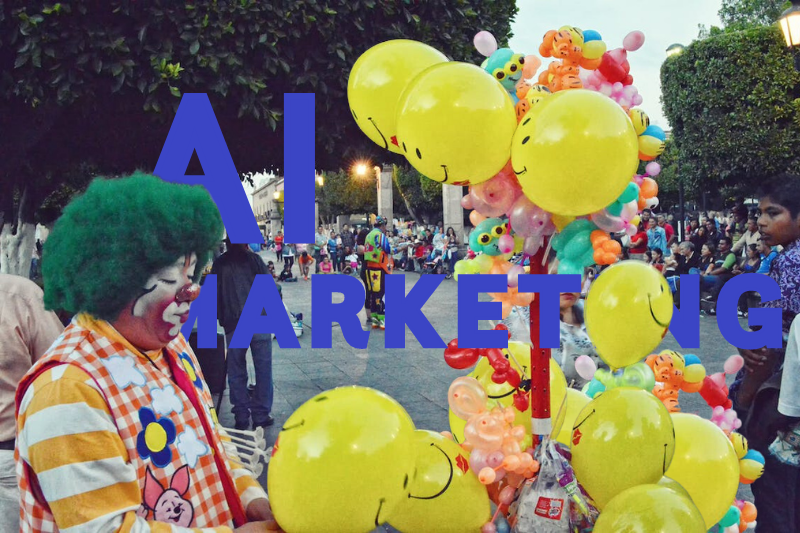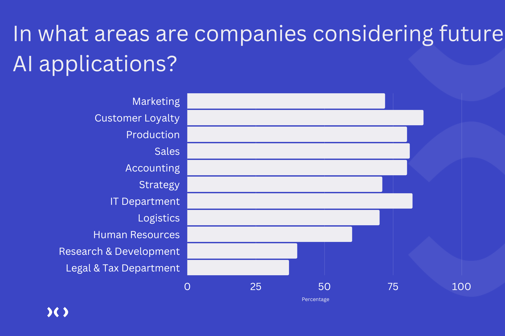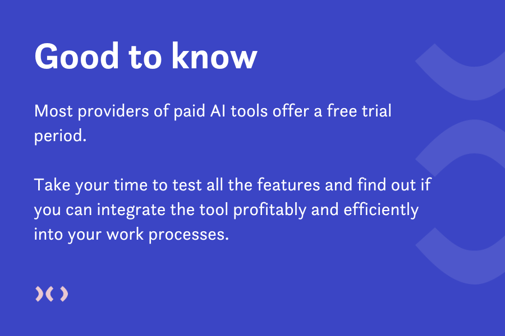
Photo Title
Artificial Intelligence in Marketing: Putting New Technologies to the Test
Artificial Intelligence is taking the world by storm and transforming nearly all sectors/industries radically. The European Parliament’s Think Tank estimates that due to increasing use of Artificial Intelligence, productivity could increase by 11 to 37% until the year 2035.
In Marketing, AI tools are already changing the way in which companies interact with (potential) customers, and use content to sell their products, and promote their brand. However, while some pioneers are already eagerly diving into this new world of AI, others are still hesitant to take the first step. Many are insecure because they don’t know where they could be heading.
Therefore, with this blogpost we want to hand you a travel guide of sorts. We’ll introduce practical use cases, in which you can integrate artificial intelligence into your marketing today, which AI tools are suitable and how to choose them in the most profitable way. Enjoy reading and have a good journey into a digital world of endless possibilities!

Source: Survey: Use of Artificial Intelligence in companies 2022, Statista
The Most Important Use Cases for Artificial Intelligence in Marketing
The scope of Artificial Intelligence in Marketing is just as wide as the range of AI tools currently available. Still, the focus lies on the creation, personalization, analysis, and distribution of content.
Content Creation
Artificial Intelligence can make content creation more efficient and effective by helping companies in producing content tailored to the needs and interests of their target group.
- Content ideas and topics: AI analyzes search trends, social media, and other data sources to identify relevant topics for content creation. This helps content managers to continuously find engaging ideas and to address the interests of their respective target group.
- Automated text generation: AI models like GPT-3 are able to generate somewhat authentic texts and therefore facilitate the creation of blogposts, product descriptions and news articles. This technology can also be used to translate content into different languages.
- Automated image and video creation: AI not only writes texts, but also helps generate images, graphs and videos for webpages, corporate blogs, social media, etc.
Content Personalization
Artificial Intelligence enables granular and highly personalized targeting of users, helping to improve user engagement, conversion rates, and overall user experience.
- A/B tests and optimization: Various AI tools support the execution of A/B tests and multivariate tests and thus enable an evaluation of the effectiveness of different content variants. This allows content to be continuously optimized and response rates to be increased.
- Adjusting content for different channels: Thanks to AI, content can automatically be adjusted to various communication channels and devices without additional hassle. For example, it can make sure that a newsletter looks just as good on a desktop as it does on a mobile device.
- E-mail marketing personalization: AI is great for creating personalized e-mail campaigns by suggesting relevant products, content, or offers to customers based on previous interactions with e-mails and the website.
Content Analysis
Content analysis through AI tools enables companies and content creators to optimize their strategies, improve their user experience, and address the needs of their target groups more precisely.
- Search Engine Optimization (SEO): Artificial intelligence is the foundation of content analysis tools that aid website hosts in optimizing their content for search engines. This includes identification of key words, monitoring of rankings an recommendation of SEO-related improvements.
- Quality assessment: AI tools are able to assess the quality of a text using criteria such as readability, grammar, style and originality.
- Automated reporting: AI can use automated reports and dashboards to collect valuable data, such as page views, dwell time, conversion rates, and social media interactions, and provide decision makers with helpful insights on the performance of content created.
Content Distribution
By integrating AI tools into content distribution, companies can increase the efficiency of their campaigns, improve the reach of their content, and optimize interactions with their target group.
- Content routing: Artificial Intelligence decides automatically, which pieces of content should be sent to which distribution channel or platform. This facilitates the optimization of content based on the platform and the preferences of the target groups.
- Social media management: AI-supported tools can automatically publish content on different social media platforms, while tracking interactions and feedback in real time. They also help choose relevant hashtags and key words.
- Chatbots and messaging apps: AI-based chatbots are used in the distribution of content through messaging apps as well as interactions with users by answering questions or giving recommendations.
The diverse scope of applications for AI tools clearly shows the advantages that future-oriented companies can already realize today through the clever use of Artificial Intelligence in marketing. This is definitely cause for celebration, especially in light of the growing shortage of skilled workers. Blind joy, however, is misguided. Because along with the new technologies, new challenges also come knocking on our office doors.
Challenges of Artificial Intelligence in Marketing
Artificial Intelligence facilitates more efficient processes and bears enormous potential for the future that we can currently grasp only vaguely. However, when AI tools come marching into our companies, we shouldn’t turn a blind eye on potential hurdles. Companies using Artificial Intelligence in marketing should be aware of the following 5 challenges in particular:
- Data quality and data protection: Artificial Intelligence in marketing requires a large amount of data. The quality of this data is crucial, and it can be difficult to collect and process high-quality and relevant information. Additionally, companies must guarantee compliance with data protection regulations to protect sensitive customer data and avoid legal issues.
- Establishing Skills: There is a shortage of skilled workers that have both knowledge in marketing and AI skills. Companies must therefore invest in trainings and further education to ensure that their employees are versed in the use of AI tools in marketing.
- Integration issues: To obtain useful results, AI systems must be smoothly integrated into existing marketing infrastructure. Due to established structures and incompatibilities between different systems and platforms, this can be difficult and require a lot of resources.
- Cost: Implementing AI solutions can be expensive, both in terms of acquiring technology and training employees. Small companies might be unable to afford AI solutions or have to compensate for trade-offs in the range of services.
- Speed of innovation: AI tools are evolving rapidly, and marketers must keep pace to remain competitive. This requires continuous adaptation, investment and personal commitment from employees.
In addition to these challenges, however, there is another aspect that determines the success or failure of any AI strategy: The choice of appropriate AI tools.
Find The Right AI Tools For Your Marketing With These 5 Tips
AI-based tools and applications to support marketing processes are a dime a dozen. And while tech pioneers are busy developing their products further, new solutions from new providers are being added practically every day. With so many to choose from, it's naturally difficult to decide. These tips will help you find the right AI tools for your marketing:
- Tip #1: Define your requirements
To find the right AI tool, you need to know what you want it to do. What tasks should it perform, what results should it deliver? There are many good solutions, but you will only really benefit if they fit your individual requirements. - Tip #2: Read reviews
What are AI tools capable of? This question is regularly asked by renowned tech magazines and industry experts. Their reviews and product comparisons give you a good overview of which tools are currently on the market and which of them are likely to fit your needs. - Tip #3: Talk to colleagues
Every marketing department faces similar challenges. Some of your colleagues may have already taken a closer look at one AI tool or another and can share their experiences with you. - Tip #4: Test the tool
The proof of the pudding is in the eating. Tests and field reports offer guidance in a wide range of offers, but only you can find out whether a certain AI tool is really worthwhile for you in practice.

- Tip #5: Monitor the results
After implementing an AI tool, check regularly to see if it really delivers the desired results consistently and reliably. Always keep an eye on new developments from other vendors. They may be able to meet your needs better than your current solution.
Conclusion: There's No Successful Marketing Without Artificial Intelligence
We are at the beginning of a technological change that will revolutionize the way we work just as the personal computer once entered the offices of this world. The integration of Artificial Intelligence in marketing is a crucial step to remain competitive in the long term and to achieve better business results.
How well we succeed in this depends not least on ourselves and how we deal with the challenges ahead: Finding the right AI tools, building the necessary know-how and, in particular, the willingness of each individual to embrace the new technologies. Those who become active now and get involved with artificial intelligence are already taking the important first step toward successful marketing of the future.
Looking for powerful AI tools for your marketing?
Book a meeting with our expert Katharina now.
Book Meeting